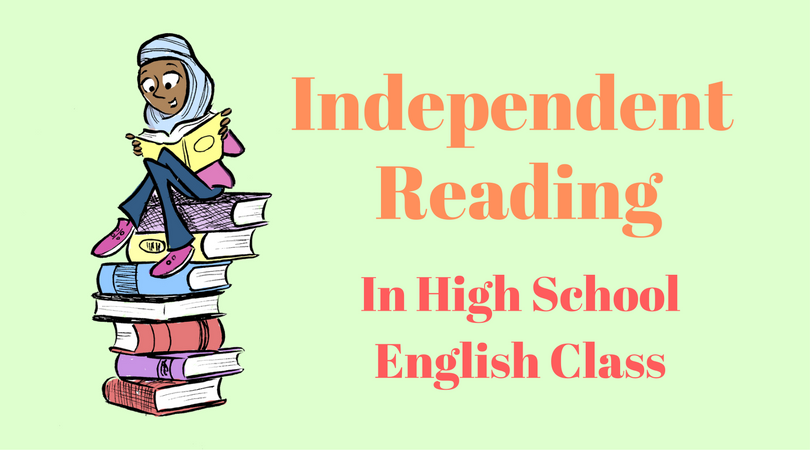
Independent reading allows students time to read whatever they want to every day. You might remember it as SSR or DEAR, catchy acronyms that originated in the elementary grades, but there are tremendous benefits to allowing students time to read books that they select themselves at the high school level.
Here’s what it looks like in my classroom: at the start of every period, the whole class spends 10-15 minutes reading whatever they want. No work is required of them. Occasionally I will talk to them about what they’re reading, but there’s never a grade attached. And most importantly, I read with them. I don’t use it to grade papers or plan lessons. Occasionally I’ll get kids caught up on work they missed, but not often. And I do this will all of my classes from regular freshmen to my seniors in AP Literature and Composition.
So what benefits have I seen?
Kids learned to like reading again.
The sad fact is that in high school kids begin to see reading as work. A lot of this is our fault. We ask them to annotate, give them study questions, and make them take tests and write papers about books. Add on the fact that most of them have busy schedules that don’t allow them to read for pleasure and reading can quickly become something to avoid.
By allowing student to read whatever they want with no strings attached, students will be transported back to that time when reading was a fun activity. They will look forward to reading every day because they’ve found a book they like and know they won’t have to do any work with it. Furthermore, it’s a nice break from all of the academic work they do throughout the day. At the end of the year several students told me that independent reading helped them love to read again, so much so that they started reading at home for the first time in a while.
It’s an effective transition from other courses.
My students tell me they like reading time because it allows them time to switch gears from whatever subject they just came from. It has also served as a nice centering activity – when we are done with reading, we are all ready to do whatever we are working on for the day. Plus, kids tell me they like the opportunity to be silent for a small chunk of the day, which in today’s school environment is a rare luxury.
Students pick out more challenging books than I would have assigned.
Many kids will choose books that are below their reading level (and that’s OK), but a lot of them are willing to try more difficult works. I have some classics on my bookshelf like Crime and Punishment, Emma, and Invisible Man, none of which I would do as a whole class novel, but have been read by students in my class. This even extended well into the fourth nine weeks with my seniors, who have a tendency to check out at the end of the year.
They read more books.
Some of my seniors tell me they have read more books this year than in all other years of high school combined. We want our students to make reading an active part of their lives, and independent reading does that.
I read more books!
Since I have five periods a day, I get a good 50 minutes of reading in most days if I’m not conferencing with kids.
They are more likely to read the books I assign.
Because I give them time to read whatever they want, they are much more likely to do the assigned reading. Part of this is because it’s part of the deal: I let them read what they want in exchange for going along with what I want to read. But a large part is also because I’ve built a classroom culture in which reading is something you do. Kids know you read books in my class. And when they are given the opportunity to get better at reading by making it a daily habit, they will be better able to tackle the required reading.
Be patient!
Sometime I didn’t see progress with kids until much later in the year. For example, one of my freshmen last year reread “The Outsiders,” which he read last year in class, because it was the only book he liked. I’m not sure that he accomplished much with it, but this year he came back to me and asked for some book recommendations. I was able to get him to read and enjoy “The Road,” “Ready Player One,” and “The Martian.” He didn’t become a reader in my class, but I planted the seeds for the following year.
Like I said, I was hesitant at first to try independent reading. After all, you’re giving up a fifth of your class time to do it. However, I’m seen tremendous benefits from it in my class. My students love reading again, and leave my classroom with their passion for reading reignited.
David Rickert is a high school English teacher in a suburb of Columbus, Ohio. He has been teaching for over 20 years and has taught virtually every grade and every subject. He is passionate about developing lessons that make difficult language arts subjects fun and engaging. He is also an author on Teachers Pay Teachers.




